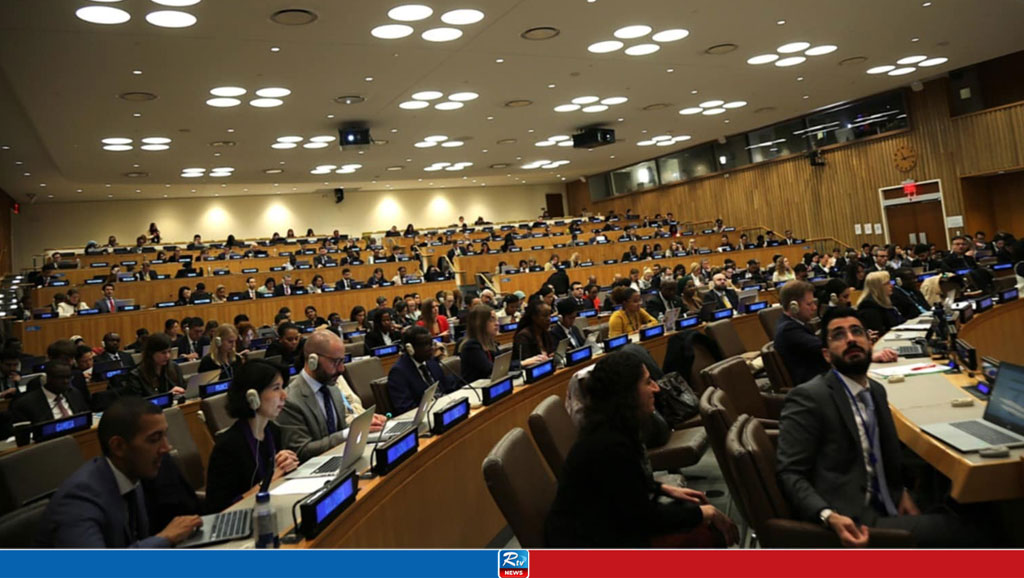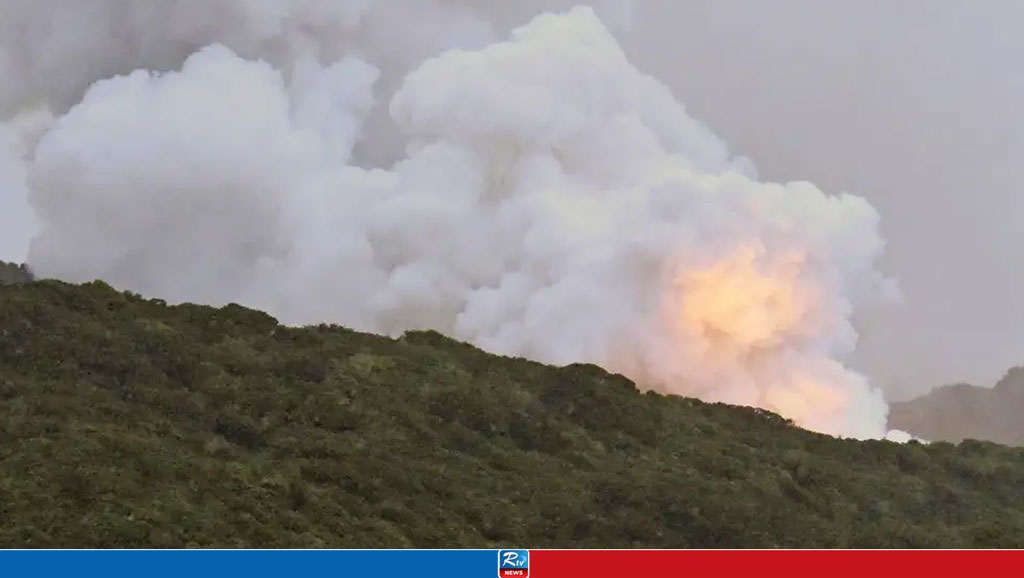Death toll rises to over 100 in the West Bank

Three people were killed in an Israeli drone strike in the occupied West Bank, the Palestinian Health Ministry said.
Israeli forces said they launched the drone strike after coming under fire from a group of people during a raid in the Jenin refugee camp.
The military said "hits were identified."
The Palestinian Authority's official news agency, WAFA, reported that the drone fired at least two projectiles, citing sources in the camp.
According to the health ministry, more than 100 Palestinians have been killed in the occupied West Bank in clashes with Israeli forces since October 7 as the Israeli military pursues Palestinian militants in the aftermath of the Hamas terror attack from Gaza.
Comments
British King Charles May Visit Bangladesh
King Charles III of the United Kingdom is reportedly planning a state visit to the Indian subcontinent. According to a report by The Daily Mirror, the British monarch, who has refrained from international travel following a cancer diagnosis earlier this year, may visit Bangladesh, India, and Pakistan in the near future.
The report, published on Friday, stated that King Charles III and Queen Camilla are preparing for a future tour of the subcontinent. As the king gradually recovers from cancer, this visit may mark his return to official international engagements. The plan to visit the Indian subcontinent is seen as a sign of significant improvement in his health.
However, The Daily Mirror did not provide specific details about when this royal tour might commence.
After the passing of Queen Elizabeth II in September last year, King Charles was compelled to cancel all official tours. However, this planned visit to Bangladesh, India, and Pakistan could mark the resumption of his international travel. The visit aligns with Britain's post-Brexit strategy to establish meaningful economic connections worldwide. Royal visits play a pivotal role in achieving this goal.
A source close to the monarchy noted, "Planning such tours for the King and Queen is very encouraging. The proposed visit to the Indian subcontinent will carry immense political and cultural significance for Britain on the global stage. At this time, King Charles and Queen Camilla are the most fitting ambassadors for the UK."
According to The Daily Mirror, the UK Foreign Office has given the green light to begin discussions with potential host nations. Draft plans are being prepared for visits to Bangladesh, India, and Pakistan. Indian Prime Minister Narendra Modi had previously expressed interest in hosting the King and Queen after their India tour was canceled last year.
However, there is some concern surrounding the royal visit to India, given Prime Minister Modi's growing ties with Russian President Vladimir Putin. The two leaders recently met at the BRICS summit, and President Putin has welcomed India’s "strategic partnership" with Russia. Despite this, Modi has emphasized that the ongoing war in Ukraine should be resolved "peacefully."
Notably, King Charles, accompanied by Camilla, toured Pakistan for a week in 2006 as the Prince of Wales. During that visit, he remarked to well-wishers, "It’s taken me almost 58 years to get to you. But I can assure you, it hasn’t been for lack of trying."

ASEF Executive Committee Meeting Held in Singapore
The Executive Committee Meeting of the Asia-Europe Foundation (ASEF) concluded in Singapore on 22 November 2024 with a renewed commitment to further collaboration between the countries from the two continents, Asia and Europe.
The Director-General, Regional Organizations of the Ministry of Foreign Affairs, Md. Rais Hasan Sarower, NDC, as the current chair of the ASEF Board of Governors, led the discussion.
In addition to discussions on a wide range of administrative and financial matters, the executive body also provided directives to enhance the visibility of the organization and recommended exploring new funding mechanisms and ensuring data privacy and strategic upgrades to make ASEF more meaningful for member states.
The meeting also approved a project proposal for women, peace, and security training proposed by the Government of Latvia.
To complement the ASEM process, in February 1997, the 1st ASEM Foreign Ministers' Meeting welcomed the establishment of the Asia-Europe Foundation (ASEF). Based in Singapore, ASEF provides opportunities for Asians and Europeans to exchange ideas and collaborate, and achieve innovative and substantive solutions for common global challenges.
Bangladesh has been the Chair of the ASEF Board of Governors for the first time since January 2024 and the term will end in December 2024.

UNGA Decides to Hold High-Level Conference in 2025 to Propose a Time-Bound Plan
UNGA resolution decides to hold an all-stakeholder high-level UN Conference in 2025 to propose a time-bound plan for sustainable resolution of the Rohingya crisis.
"For us and the for sake of regional as well as international security, creating conditions for the safe, voluntary, and dignified return of the Rohingyas to Myanmar is of the utmost importance" – said Ambassador Muhammad Abdul Muhith, Permanent Representative of Bangladesh to the United Nations while delivering statement after the adoption of the resolution on Rohingya Crisis at the Third Committee of the United Nations General Assembly (UNGA) today.
The resolution entitled "The situation of human rights of Rohingya Muslims and other minorities in Myanmar", jointly tabled by the OIC and the EU has been adopted in the Third Committee of the UNGA by consensus which was cosponsored by 106 countries, marking a significant level of international support.
Through the resolution, member states decide to hold an all-stakeholder high-level conference, at the earliest possible time in 2025, on the situation of Rohingya Muslims and other minorities in Myanmar, to review the overall crisis to propose a comprehensive, innovative, concrete, and time-bound plan for a sustainable resolution of the crisis, including voluntary, safe and dignified return of Rohingya Muslims to Myanmar. The organization of the high-level Conference was a call from the Hon'ble Chief Adviser of Bangladesh, Professor Muhammad Yunus, during the high-level week of the 79th UNGA in September.
This year, the resolution, among other issues, called to ensure the right to return of all refugees, including Rohingya Muslims taking shelter in other countries, and take concrete actions to create conditions necessary for voluntary, safe, dignified, and sustainable return and reintegration. It recognizes and highlights the serious human rights violations and abuses including killings, destruction and burning of houses, hindrance in accessing humanitarian assistance, and forced recruitment of civilians, particularly Rohingya Muslims and other minorities including children. It also reaffirmed its commitment to support all accountability processes to bring the perpetrators to justice. The resolution further emphasizes the critical role of ASEAN as a regional organization and highlights its initiatives in fulfillment of the five-point consensus in its entirety.
In his statement, Ambassador Muhith described, how the protracted presence of the Rohingyas in Bangladesh, has created a complex and worrisome situation. He expressed disappointment that no real progress could be made in the last seven years to address the root causes of the crisis.
Referring to the Security Council resolution and the resolution adopted today in the Third Committee of the General Assembly, he urged the international community to take necessary actions in creating conditions necessary for the return of Rohingya Muslims. He also emphasized adequate funding for the humanitarian response plan to support the Rohingya Muslims, pending their return.
The adoption of the resolution by consensus is a significant step forward, demonstrating the strong commitment of the international community towards a durable resolution of the crisis.

Calin Georgescu Leads Romania's Presidential Race in First Round
Far-right nationalist Calin Georgescu has emerged as the frontrunner in Romania’s presidential election, securing 22% of the vote in the first round, according to preliminary results. Pro-European Prime Minister Marcel Ciolacu trailed closely with 20%, with the final results determining which two candidates will advance to the decisive run-off on December 8.
A Surprising Upset in Romanian Politics
Georgescu’s rise as an independent candidate has upended expectations in the closely watched election. Known for his nationalist rhetoric and criticism of Romania’s alignment with NATO and the EU, Georgescu bypassed traditional campaign methods, relying instead on TikTok to attract young and disenchanted voters.
Prime Minister Ciolacu, a veteran of the populist Social Democrats, represents a continuation of Romania’s pro-European stance and efforts to address domestic economic challenges. His focus on stability and social reforms contrasts sharply with Georgescu’s sovereignty-centered platform, which calls for a reevaluation of Romania’s international alliances.
Economic Struggles Fuel Anti-Establishment Sentiment
Romania’s economic woes have heavily influenced the election. With the highest poverty risk in the EU, affecting 35% of the population, and rising inflation exacerbating the cost of living, many voters have turned to anti-establishment candidates. Georgescu’s criticism of Romania’s "subservience" to NATO and the EU, including opposition to the NATO missile defense shield in Deveselu, resonated with voters seeking change.
Ciolacu, meanwhile, has promised to leverage EU funding to tackle inequality and improve living standards. He has also reaffirmed Romania’s commitments to NATO and its support for Ukraine amid the ongoing war.
Broader Implications of the Run-Off
Romania’s presidency holds significant influence over foreign policy, making this election pivotal for the country’s international positioning. A victory for Georgescu could signal a shift toward nationalist policies, potentially weakening Romania’s ties with NATO and the EU and aligning the country more closely with Russian interests. Conversely, a win for Ciolacu would likely sustain Romania’s current pro-Western trajectory, reinforcing its role in European security and economic frameworks.
A Rising Far-Right Tide
Georgescu’s success mirrors the growing influence of far-right populism across Europe, where economic grievances and disillusionment with traditional elites have fueled nationalist movements. His unorthodox use of TikTok has highlighted the increasing role of social media in mobilizing younger voters, bypassing traditional political channels.
As Romania prepares for the December 8 run-off, the outcome will shape the country’s domestic and foreign policies for years to come. The election has become a referendum on competing visions—pro-European stability versus nationalist sovereignty. With turnout and voter mobilization poised to be decisive, Romania’s future direction hangs in the balance.

DHL Cargo Plane Crashes Near Vilnius Airport in Lithuania
A cargo plane flying on behalf of German logistics company DHL crashed near Vilnius International Airport in Lithuania early on Monday, killing at least one person, according to Lithuanian officials.
The deceased person was confirmed by Lithuanian police to be a Spanish national and a member of the flight crew, although not one of the pilots.
The other occupants of the plane — a German, a Lithuanian, and another Spaniard — were reportedly injured, but their condition remained unclear.
What did DHL say?
"We can confirm that today, at approximately 4:30 am CET [0330 GMT], a Swiftair aircraft, operated by a service partner on behalf of DHL, performed an emergency landing about one kilometer from VNO Airport [Vilnius, Lithuania] while en route from LEJ Airport [Leipzig, Germany] to VNO Airport," the German company said.
A spokesperson for DHL Lithuania told the Reuters news agency that the company has opened an investigation, adding: "We do not have any information that any of the parcels onboard the crashed cargo plane were suspicious."
German investigators also said they were "in close contact with the involved parties at home and abroad to clarify the issue as soon as possible."
Aircraft manufacturer Boeing also said it was "working to gather more information" and stood "ready to provide any support."
What do we know so far about the DHL crash?
The plane, operated by Swiftair, had originated in the German city of Leipzig, which is a hub for DHL.
"It fell a few kilometers before the airport, it just skidded for a few hundred meters, and its debris somewhat caught a residential house," Renatas Pozela, the head of the Lithuanian rescue service said.
"Residential infrastructure around the house was on fire, and the house was slightly damaged, but we managed to evacuate people," he added.
Twelve residents were evacuated from the building, according to officials.
Vilnius Mayor Valdas Benkunskas said the plane missed the house "by chance" and crashed into the courtyard.
The cause of the crash is still unknown, and terrorism is not being ruled out
The cause of the crash was not immediately known, but Lithuania's police chief Arunas Paulauskas did not rule out terrorism as a motive.
"This is one of the versions that need to be investigated and verified. There is still much work ahead of us," Paulauskas said at a press briefing.
"These answers will not come so quickly," he added, saying that the crime scene probe, evidence collection, and gathering of information and objects could take an entire week.
According to data from rescue services, emergency crews were alerted about the crash at 5:28 a.m. local time (0328 GMT).
"City services are currently onsite, along with a fire truck and a command team from Vilnius Airport," the Lithuanian airport authority posted on X.
"Airport operations are not disrupted at this time."
Series of cargo-related incidents
German security services warned back in August of "unconventional incendiary objects" being posted via cargo services.
Warnings were issued in connection to an object that caught fire at DHL's Leipzig logistics center in July, having reportedly been sent from the Baltic States.
Also in July, similar incidents were reported when devices caught fire at courier depots near Warsaw, Poland, and Birmingham in the United Kingdom, with Lithuanian Prosecutor General Nida Grunskiene saying that packages had originated in Lithuania.
Both Poland and Lithuania share borders with the Russian exclave of Kaliningrad, and sabotage was not ruled out.
"I can state that this is part of unconventional kinetic operations against NATO countries that are being undertaken by Russian military intelligence," Kestutis Budrys, a national security adviser to Lithuanian President Gitanas Nauseda, told the Reuters news agency earlier in November.
"We note that these operations are being escalated: their focus is moving ... to harming infrastructure and actions that could end up killing people," he added.
Moscow has denied the accusations.

Japan's Space Agency Aborts Epsilon S Rocket Test After Fire
Japan's space agency, JAXA, aborted an engine test for the Epsilon S rocket after a large fire broke out at the Tanegashima Space Center on Tuesday.
"There was an abnormality during today's combustion test. We are trying to assess what happened," JAXA said.
Footage on national broadcaster NHK showed flames and smoke rising from the site on the southern Japanese island.
Journalists positioned around one kilometer (0.62 miles) away reported a large explosion shortly after the test began at 8:30 a.m. local time (2330 GMT).
Nobody reported hurt, investigation announced
No injuries were reported, and the cause of the incident is under investigation.
"JAXA will conduct a thorough investigation into the cause of the problem and consider countermeasures," said Chief Cabinet Secretary Yoshimasa Hayashi, the Japanese government's top spokesperson.
"The development of flagship rockets is extremely important for the independence of Japan's space development program."
But the Asahi Shimbun newspaper reported that JAXA's plan to launch the Epsilon S — the successor to the Epsilon — by March 2025 was now practically impossible.
Japan's space program has faced several setbacks, including failed launch attempts for its next-generation H3 launch system.
In March, a rocket made by a private Japanese company, Tokyo-based Space One, exploded seconds after launch.

Mahathir Calls for Unity Among Bangladesh’s Political Leaders
Former Malaysian Prime Minister and architect of modern Malaysia, Mahathir bin Mohamad, has urged Bangladesh's political leadership to work on the basis of consensus, avoiding divisions. He made this appeal on Wednesday (November 27) during an event in Kuala Lumpur.
Speaking at a press briefing following the event, in response to a question by Mohammad Alauddin, Executive Director of the International Islamic University’s PhD researchers' group (IPGZ), regarding recent developments in Bangladesh, Mahathir said, “The people of Bangladesh have bravely ousted an unpopular and autocratic ruler. They now have the opportunity to rebuild the country.”
He added that Bangladesh can move forward if its leaders avoid new divisions and work together in the national interest, prioritizing the country over individual agendas.
At the same event, another speaker, Malaysia’s former Foreign Minister and politician Tan Sri Hamid Albar, described Bangladesh as an important country in South Asia. He commended the hard-working nature of its people, noting that the country is progressing in various areas. Referring to the recent popular uprising, he remarked that Bangladesh now has a rare opportunity for reconstruction. He emphasized the need to take effective measures to reduce income and wealth inequality to ensure sustainable democracy.
Calling for efforts to enhance Bangladesh’s image internationally, he added, “We fully support Bangladesh’s inclusion in the Southeast Asian regional bloc, ASEAN.”


 Live Tv
Live Tv




